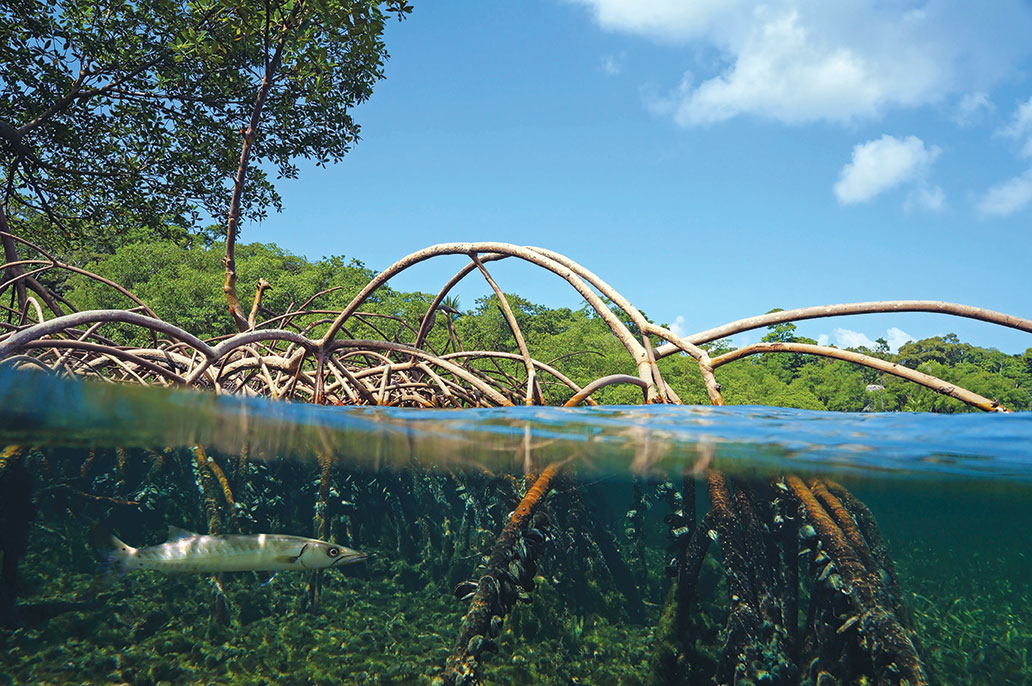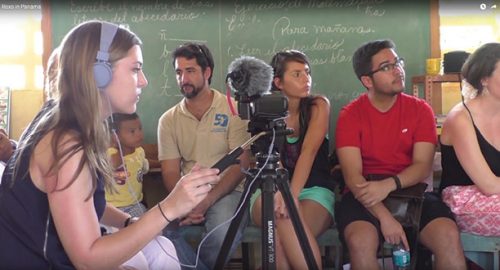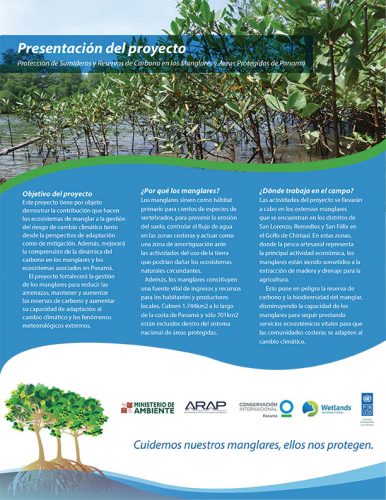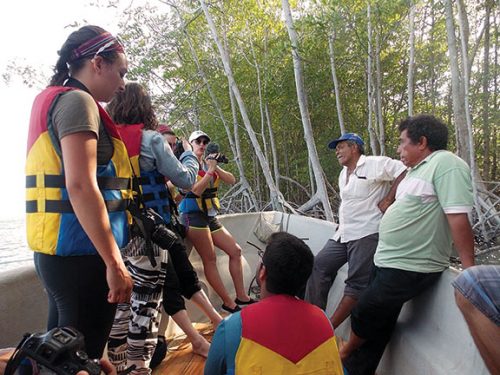
Roxo’s Message on the Panamanian Mangroves
TCU’s student-run strategic communication agency is helping to protect a vital and endangered resource.
Cami Fannin caught her breath at the first sight of the piedra gosas, or what the local fishermen along Panama’s southwestern coast call the rock mangrove. Their soft gray roots twisted from the Port Pinzones estuary like gnarled fingers grasping at the sand floor below the water’s surface.
These gentle giants grow along the currents where the brackish seas of the Pacific Ocean meet fresh water pooled along the marshy banks. The unique conditions are the optimal environment for the trees to flourish.
The Central American nation’s mangroves don’t look endangered. Yet they are in trouble — from trash disrupting the ecosystem to scavengers cutting their angled trunks and curled shoots for a fast buck. As the forest disappears, coastal villages face a loss of industry and a natural barrier to withstand storms. The planet also loses an ally in storing carbon, which helps minimize the effects of climate change.
“I researched these mangrove trees for months in preparation for the trip, and I thought I knew all about them,” Fannin said. “But after I saw them up close for the first time, I realized that they are real and tangible, and it’s vitally important that we protect them.”
Fannin was among eight students traveling with Roxo, the student-run advertising and public relations agency in the Bob Schieffer College of Communication. The group visited its first international client, Wetlands International Latin America and the Caribbean, as part of a climate change project the nonprofit is conducting in Panama.

Members of Roxo filmed schoolchildren in Remedios for a Spanish-language video.
During spring break, the students explored mangrove forests and the villages that rely on them. They collaborated with the Netherlands-based Wetlands to document its restoration project in the Chiriqui Province. Since 1996, the nonprofit has operated a Central American headquarters in Panama to follow its mission of sustaining and restoring wetlands, along with their resources and biodiversity. Wetlands International is the only global nongovernmental organization dedicated to protecting these areas and the communities that depend upon them.
Roxo and the Dutch nonprofit started a partnership in 2014 when Wetlands visited TCU with two other Panamanian organizations as part of the Global Academy Program. Margaret Ritsch, instructor and faculty adviser for Roxo, brought the nonprofit back in Spring 2015 to speak to her capstone campaigns class and be its semester-long client. In Fall 2015, she signed the organization as Roxo’s first international client.

Roxo designed brochures in Spanish and English to assist Wetlands International’s conservation efforts.
For the student agency, it was an opportunity to broaden its client scope.
“The university wanted to expand its study-abroad program and give students new places to go and learn,” said Ritsch. “I wanted to have a trip during spring break that was just a week and geared to work Roxo could do. I really wanted an international experience for our students. And they did too.”
Since 2012, under Ritsch’s tutelage, Roxo has worked with mostly Fort Worth-Dallas-area businesses and nonprofit groups
on messaging and branding.
Sander Carpay, communication coordinator for Wetlands in Panama, agreed that his organization and the student group could help each other. The nonprofit wanted a stronger social media presence and a video translated in multiple languages to show around the world.
Roxo timed the project to coincide with the International Climate Summit in Paris, where Wetlands wanted a presence. The Chiriqui initiative is new for Wetlands, which is involved with scientific research and garnering support for mangrove conservation.
To understand the entire scope of Wetlands’ work, the students needed to see the trees and the villages for themselves. In March, Ritsch and the students, two of whom spoke Spanish, traveled to Chiriqui to document the restoration efforts, then build out a campaign.
“Our focus is connecting with leaders, teachers and members of the community and reinforcing how important the mangroves are on the environment,” said Alexandra Van Cleef, a senior strategic communication major. “They know how it affects their daily lives because they rely on the mangroves for fishing and tourism.”
Students interviewed local fishermen who want to expand their business to include eco-tours. They also visited village schools with which Wetlands is hoping to partner and spoke with the mayor of the city of Remedios.

TCU students from the Bob Schieffer College of Communication filmed fishermen in Port Pinzones, Panama.
“One of the biggest takeaways was the challenge of working in multiple languages,” said Van Cleef, who served as a translator on the trip. “Converting slogan ideas into Spanish to hear how they sound and look was a new experience. It feels cool to apply things you learn in the classroom into real-life situations. Adding a language made it even more of a special opportunity.”
“A trip to a place like Panama really broadens the students’ perspective,” Ritsch said. “We talked with the people there. We ate with them. We went where the locals go for entertainment. It was an experience of cultural immersion.”
During the six-day visit, the students created blogs, videos and social media postings about the mangrove project for the nonprofit organization. They mixed in fun too, visiting the Panama Canal and a coffee plantation. They also hiked through a rain forest and relaxed on the beach.
“This is more personal to me now,” Fannin said. “I want to recycle more. Trash is such a problem for the villages. Without a good garbage system, trash gets thrown in the mangroves and washes up from the water. After seeing what Wetlands is doing in Panama, I want to raise awareness about the environment, especially the mangroves.”
The trip broadened the scope of students’ skills and put them in a position to think globally, said Ritsch.
Students agreed, saying that a campaign that impacts the world is meaningful and increased their desire to work for an international employer.
“The world has a global economy, so TCU aims to give students a global perspective,” Ritsch said. “They’ve worked with clients in town, and that’s great. But now, they also have an international experience from which to build. We want to keep that going.”

Your comments are welcome
Comments
Related reading:
Features
Our Marching Band, the Pride of TCU
In its 111th year, the band still practices hard, relies on teamwork and performs with passion.
Features
Kelubia Mabatah’s Comeback
Former TCU tennis player forges on after a traumatic brain injury.